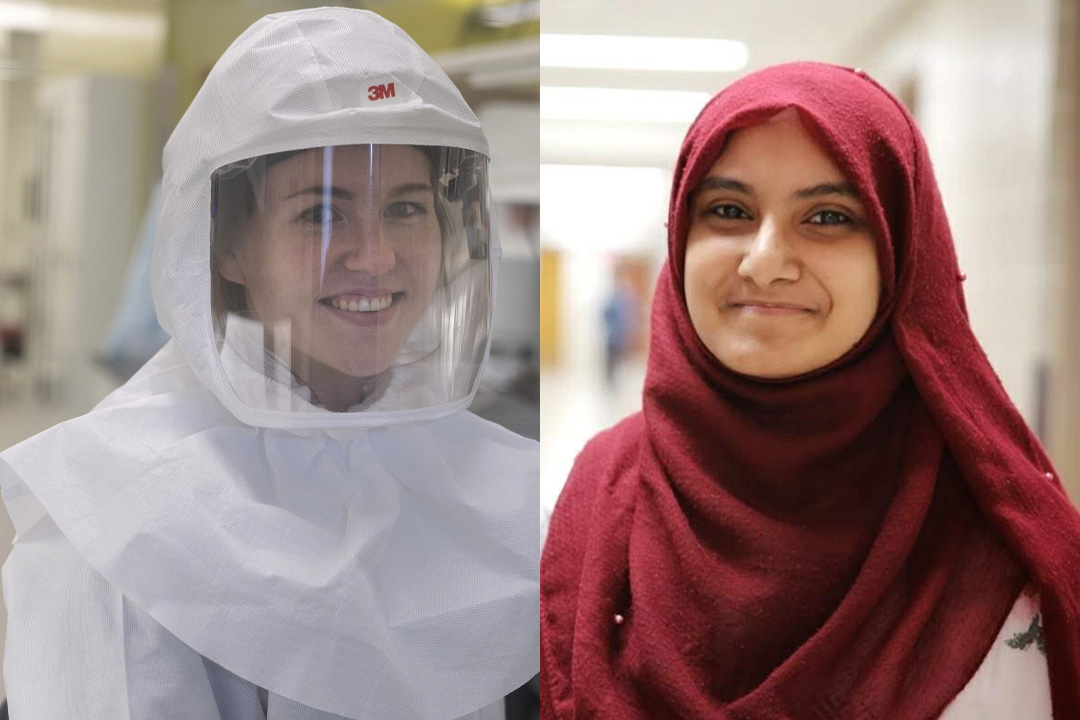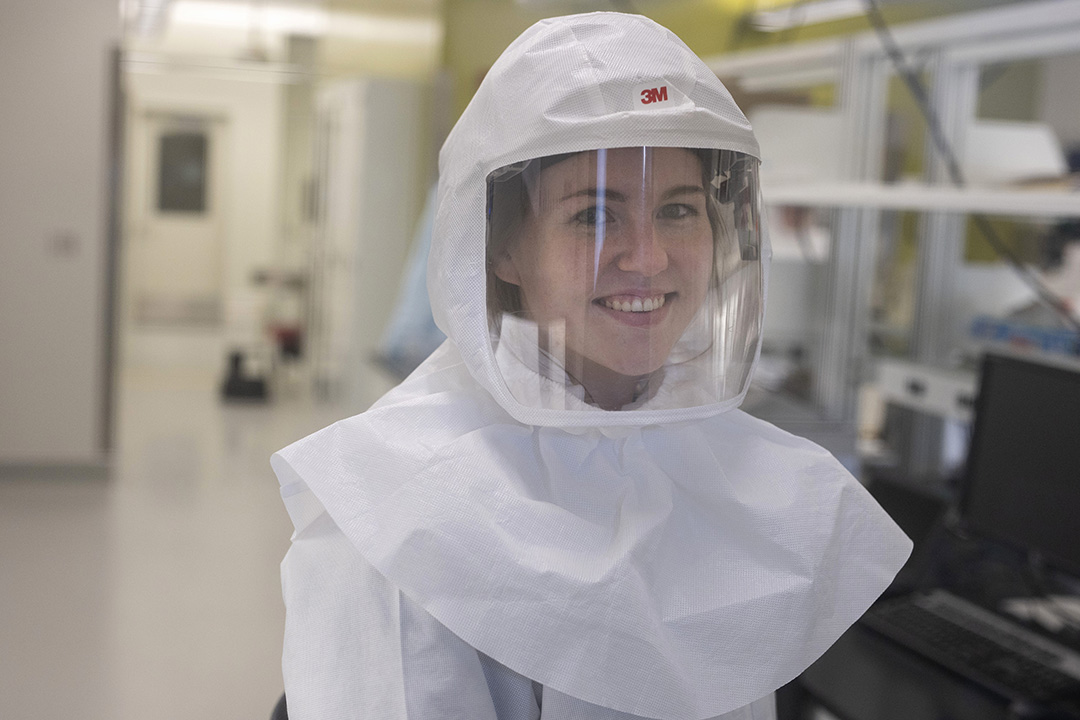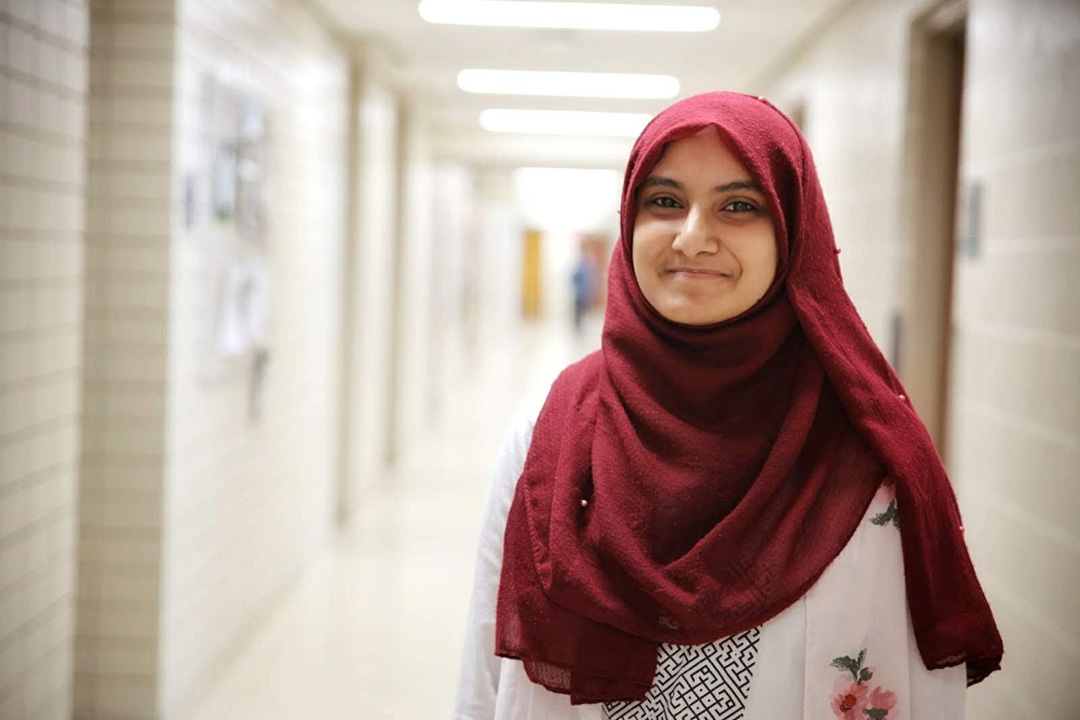
USask Convocation: Completing a PhD program in a pandemic
For many university students, Fall Convocation represents a culmination of hard work, perseverance and late nights.
By Amanda WoroniukFor two University of Saskatchewan (USask) College of Medicine graduate students, their path took an unexpected turn during the pandemic, which ultimately led them to contribute to COVID-19 research.
Early in 2020, Magie Francis and Juveriya Qamar Khan shifted their research to focus on severe acute respiratory syndrome coronavirus 2 (known as SARS-CoV-2), the virus that causes COVID-19.
The Department of Biochemistry, Microbiology and Immunology students were both in research programs that required them to work in a Level 3 containment laboratory at the Vaccine and Infectious Disease Organization (VIDO), Canada’s Centre for Pandemic Research, on the USask campus.
Conducting research on the virus that caused the pandemic posed a unique challenge because of the heightened safety measures, protocols, and the urgency of the research. Francis and Khan have now completed their PhD programs and will graduate during USask’s Fall Convocation on November 13. They shared their experience undertaking graduate studies during a pandemic.
Magie Francis

“I wish I had known that it’s OK not to have all the answers right away. The whole point is to keep learning and growing,” said Francis, reflecting on her program.
Francis completed a bachelor’s degree in biology at St. Francis Xavier before pursuing graduate school at Dalhousie University. Following that, she began her PhD studies studying flu viruses and vaccines with supervisor and virologist Dr. Alyson Kelvin (PhD). In January 2020, Kelvin moved her research program to VIDO and Francis joined her as a transfer student, where she spent the next several years in the lab doing COVID-19 research.
“When SARS-CoV-2 emerged, the scientific community needed to know everything about it: who it could infect, what the disease looked like, what the spectrum of disease was, who was vulnerable to severe disease, how do we study it, and how do we protect against it,” said Francis.
Scientists know that when an individual gets a respiratory virus like the flu, factors such as age and sex can affect how severe their illness is. SARS-CoV-2 is a type of coronavirus, but not the first the world has experienced. While some coronaviruses can cause serious health issues, others are seasonal and only cause symptoms that mimic a cold.
“Given that we all would have been exposed to these common cold coronaviruses before COVID-19, I wanted to know how getting a cold might affect a later SARS-CoV-2 infection,” said Francis of her research focus. “As SARS-CoV-2 spread, it accrued mutations leading to variants that are slightly different versions of this virus, leading me to study how getting exposed to one variant might affect a later variant.”
During her research, Francis observed that some groups of people were more impacted by COVID-19 than others.
“Overall, my studies showed that these host factors do indeed affect COVID-19 outcomes. Age, sex, and what viruses we are exposed to in the past all can affect how we experience a given COVID-19 exposure,” she said.
Francis also sought to determine whether having a previous infection would lead to increased immunity for people who had been exposed to the virus.
“Getting a common cold does not provide sufficient protection against COVID-19 and even when we’ve been exposed to SARS-CoV-2 itself, our protection from an infection doesn’t last forever, so masking and getting vaccinated annually are essential to staying safe.”
Juveriya Qamar Khan

Khan earned a master’s degree in virology in India before joining a World Health Organization-funded laboratory, which like VIDO, was a secure research facility. Following this, Khan made the significant decision to move to Canada to begin her PhD program at USask where she intended to focus on the Bovine Viral Diarrhea virus. However, when the pandemic struck, Khan transitioned her work to studying SARS-CoV-2 with supervisor and virologist Dr. Joyce Wilson (PhD). For Khan, the transition was relatively smooth.
“Fortunately, both are RNA viruses, and I had experience working with an RNA virus, which allowed me to switch my work to SARS-CoV-2,” said Khan.
Khan’s research centred on understanding how SARS-CoV-2 interacts with host factors and proteins in human cells, and how these interactions help the virus to replicate.
“Viruses rely on specific factors in your body, such as certain proteins and certain molecules, to replicate,” explained Khan. “If we can identify these factors that are important for the virus and dispensable for us, we could then target these molecules and find drug therapies.”
Khan also wanted to explore the possibility of repurposing existing drugs, such as those used to treat other diseases like cancer, to help treat SARS-CoV-2 infections.
“We were trying to show that many drugs are already available for other diseases and wanted to see if some of these drugs could be used against SARS-CoV-2,” said Khan. “However, we didn’t want to use every drug because there are so many. We wanted a targeted approach.”
Using a process to focus on screening specific drugs, Khan noticed that some drugs were more effective in attacking the virus than others.
“Some were chemotherapeutic drugs; some are Alzheimer’s drugs. These are drugs that have already been tested to be safe for human use,” said Khan. “We tested some of these and found some that were effective against SARS-CoV-2 and COVID-19.”
Completing a PhD program is a long journey. Both Khan and Francis indicated the importance of a strong support system, especially during the challenging times of the pandemic. Additionally, being in the lab helped take their minds off the difficult times during the pandemic, even if they were away from their hometowns.
“It is challenging but I enjoy working in the lab. I used to call the lab my second home and it truly is. I enjoy being in the lab and I had good lab mates who I could talk about science with and are very much like a second family,” said Khan.
Moving into the next chapter of their educational journeys, Khan and Francis are excited about the opportunities that lie ahead. Khan is engaged in post-doctoral studies under the supervisor of Dr. Anil Kumar (PhD) and is building on her research from her PhD program. She has considered one day becoming a faculty member or running her own research program. Meanwhile, Francis has returned to Atlantic Canada and continues to be involved in research endeavours.
What advice do they have for graduate students?
“Always prioritize your well-being. Graduate school can be tough, and it’s not for everyone—that’s OK! But if you love what you’re doing and are ready to work hard (and have some fun along the way), a PhD might be the right path for you,” said Francis.
Together we will support and inspire students to succeed. We invite you to join by supporting current and future students' needs at USask.

